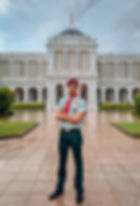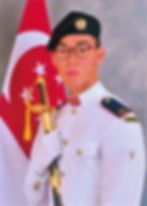Scouting and the Military
- Feb 15, 2022
- 4 min read
Updated: Jun 28, 2023
Written by Siauw Yu Chuan and Tan Jen Kai
Below are the reflections of our Rover Scouts on the relationship between scouting and the military. All photos used were taken following current SMM or pre-pandemic.

SIAUW YU CHUAN (SPL 2017, COMBAT ENGINEER OFFICER – CBRD)
The scouting experience in CHS provides a good foundation for military performance as Scouts progress into their National Service. Today, many of my scouting brothers go on to do well in the army, 6 of us commissioning together as Officers, some graduating as specialists and some making their way into the elite units. There are many parallels between the CHS scouting experience and the military. From inspections and force preparations to hikes and route marches, hard skills such as survival, knots and navigation all come in handy giving us an edge in the field. But beyond the hard skills, scouting has taught us to always be resilient when facing challenges, to be kind and benevolent and most importantly to be prepared…
During CBRD training, when the words “Gas, Gas, Gas!” are shouted, we only have a few seconds to mask up to protect ourselves from potential chemical threats. CBRD responders are trained to operate in contaminated environments to tackle invisible and silent killers. From chemical warfare agents, biological weapons as well as radiation devices, a single drop or whiff of these substances is fatal.

Being prepared is the most important lesson I learnt as a Scout. Reminiscing the VOJs as well as the sudden late-night evacuations, I realised the importance of being adaptable and mission-focused. Training in CBRD brought back memories of SRIT, being thrown into all sorts of scenarios and expected to come up with a solution. Every scenario is special and requires a unique solution. What does it mean to be prepared? It is to be comfortable with change and adapt to the scenario. There is no model answer, only a better solution. It takes both knowledge and creativity to come up with an informed solution to solve complex problems.
To the current Scouts and Ventures, throughout your scouting journey and in NS, things may not always go as planned. There will always be a chance of human error and changes in the environment, but never lose sight of the end goal. We need to adapt and persevere through unforeseen circumstances. From pioneering in the rain to reacting to an evac at night, we learn to become comfortable with change. This attitude will bring you far in the future. Planning is important, but never fall in love with your plans, always be prepared for the unforeseen and unexpected.
“Be Prepared... the meaning of the motto is that a Scout must prepare himself by previous thinking out and practising how to act on any accident or emergency so that he is never taken by surprise.”
~Robert Baden-Powell

TAN JEN KAI (PL 2017, ARMY INTELLIGENCE OFFICER - GUARDS)
The Army Scout’s primary function is to operate as the eyes and ears of the battlefield, constantly collecting key elements of information and intelligence that will shape the course of the battle even before the H-hour. Inserted deep behind enemy lines, it is a dangerous vocation that requires mastery of reconnaissance competencies, but beyond that, critical soft skills such as discipline, self-awareness and strategic planning, of which the scouting experience in my formative years provided a strong foundation.
One can certainly appreciate and draw the parallels between scouting and National Service more after going through both phases of life. Scouting or Co-Curricular Activities (CCAs) in a broader view and National Service serve as a rite of passage for every Singaporean student and son, providing valuable experiences outside of the classroom to develop core competencies in a 21st Century, VUCA world.

My experience as a Patrol Leader could be described as a grand world tour, allowing me to travel to corners of Singapore I had never visited in my life, venture through swamps, wetlands and nature reserves, while meeting peers from all walks of life and having the opportunity to lead some of my juniors in a Patrol. Force preparation, a military term for pre-mission packing and rehearsing, was practised in Scouts through the open and closed, standardised inspections we carried out before moving out to Ubin or Sarimbun. This earlier experience in scouting stressed the importance of being prepared before a mission or any execution and allowed me to adapt quickly to the Army’s method of inspection.
Before every orienteering hike, we would be involved in the planning phase, plotting out hike routes and checkpoints and securing all logistics and manpower. 知彼知己,百战百胜. I truly recognised the gravity of this adage, espoused by our Volunteer Scout Leader Wei Long, when I was introduced to mission planning as a Specialist Staff Officer, where every line drawn on the topographical map represents real lives and every military symbol placed has a resultant effect on the mission success. This demanded stringent analysis of terrain and a deep understanding of the enemy’s intent to ensure decisions were made to minimise casualties and guarantee a swift and decisive victory, something which was instilled earlier on in scouting as well.
Operating on the ground as an Army Scout brought back many fond memories of the scouting days as it reminded me of the time we spent camping and being outdoors. The training camps in Ubin and Sarimbun also educated us to be alert and aware in foreign environments, as we performed sentry duties and eventually on the last night of each camp, had to “extricate and evacuate” from our campsite to safer ground.

Similarly, I was able to apply my learning during scouting to the Army during our reconnaissance missions. As an element that operates behind enemy lines, the threat of facing enemy contact is always real and such encounters could present life or death situations to our teams. This required steadfast discipline and sharp awareness of ourselves and our surroundings, to not reveal our position while approaching the enemy’s objective. It was a game of 追踪 in real life, but with much more dire consequences.
Overall, my years spent in scouting and National Service were instrumental to my development as a Scout, soldier and leader. There are not many other institutions or organisations that can provide the same life experience and lessons. While National Service has been an endeavour with adversity and challenges, the values inculcated in scouting definitely helped me to adapt quicker, think deeper, and lead more effectively.
